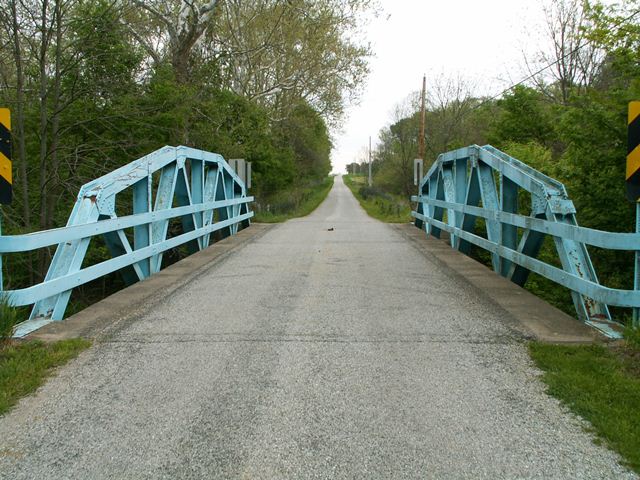We Recommend:
Bach Steel - Experts at historic truss bridge restoration.
BridgeHunter.com Phase 1 is released to the public! - Visit Now
Dixon Road Bridge
TR-242 Bridge

Primary Photographer(s): Nathan Holth
Bridge Documented: May 7, 2006
Rural: Preble County, Ohio: United States
1958 By Builder/Contractor: Champion Bridge Company of Wilmington, Ohio
Not Available or Not Applicable
53.2 Feet (16.2 Meters)
61.0 Feet (18.6 Meters)
18 Feet (5.49 Meters)
1 Main Span(s)
6836488

View Information About HSR Ratings
Bridge Documentation
View Archived National Bridge Inventory Report - Has Additional Details and Evaluation
About This Unusual Bridge Design
This bridge is one of a number of unusual pony truss bridges built by the Champion Bridge Company in Preble County well after the truss bridge era had come to a close in most of the country. They are noted for their use of modern design such as rolled beams and omission of any built-up beams, while continuing the older, traditional use of rivets for connections. The riveted connections are a contrast to the welded truss bridges that were built in Ohio around the same time as these bridges and continue to be built in the present day. The riveted connections add to the visual qualities of the bridges, compared to the plain-looking welded connections.
The 1950s and 1960s were the final home run of a transition from aesthetic bridge design to "purely functional" bridge design, where the "art" in bridge building came to a close thus ending a tradition of beauty in bridges. As a result, this bridge, with a 1958 construction date, represents the end of this transition. While it still has aesthetic value, mainly in the old-fashioned rivets, it is quite plain, with its rolled i-beams.
About the Dixon Road Bridge
The Dixon Road Bridge is one of the shortest of these bridges in Preble County. Champion Bridge Company must have been offering good deals on its bridges to be able to convince a county to erect a truss bridge on a crossing that could have easily been spanned by the steel beams of the day.
Information and Findings From Ohio's Historic Bridge InventorySummary of Significance The one span, 61' long, Warren with pony truss bridge is riveted, and the 1981 ODOT bridge survey indicates it was fabricated for the county in 1958 by the Champion Bridge Company. The truss members are all rolled section and they are connected by rivets at the panel points. The bridge has no distinctive or innovative details, and is basically the same bridge built for decades. The Champion Bridge Company of Wilmington, incorporated in 1878, was among a handful of Ohio's bridge-building companies that survived into the latter part of the 20th century. Extant examples of the company's bridges from the 1940s and 1950s all have the traditional riveted shop and field connections. The firm continued to fabricate and erect steel bridges with most of the work in Indiana, Ohio, and Kentucky. Champion reported that it had a reputation among county engineers for its quality work and knowledge of older truss bridges and ways to repair or strengthen them economically, "thus stretching limited county funds." Bridge Considered Historic By Survey: No |
![]()
Photo Galleries and Videos: Dixon Road Bridge
Bridge Photo-Documentation
Original / Full Size PhotosA collection of overview and detail photos. This gallery offers photos in the highest available resolution and file size in a touch-friendly popup viewer.
Alternatively, Browse Without Using Viewer
![]()
Bridge Photo-Documentation
Mobile Optimized PhotosA collection of overview and detail photos. This gallery features data-friendly, fast-loading photos in a touch-friendly popup viewer.
Alternatively, Browse Without Using Viewer
![]()
Maps and Links: Dixon Road Bridge
Coordinates (Latitude, Longitude):
Search For Additional Bridge Listings:
Bridgehunter.com: View listed bridges within 0.5 miles (0.8 kilometers) of this bridge.
Bridgehunter.com: View listed bridges within 10 miles (16 kilometers) of this bridge.
Additional Maps:
Google Streetview (If Available)
GeoHack (Additional Links and Coordinates)
Apple Maps (Via DuckDuckGo Search)
Apple Maps (Apple devices only)
Android: Open Location In Your Map or GPS App
Flickr Gallery (Find Nearby Photos)
Wikimedia Commons (Find Nearby Photos)
Directions Via Sygic For Android
Directions Via Sygic For iOS and Android Dolphin Browser
USGS National Map (United States Only)
Historical USGS Topo Maps (United States Only)
Historic Aerials (United States Only)
CalTopo Maps (United States Only)

